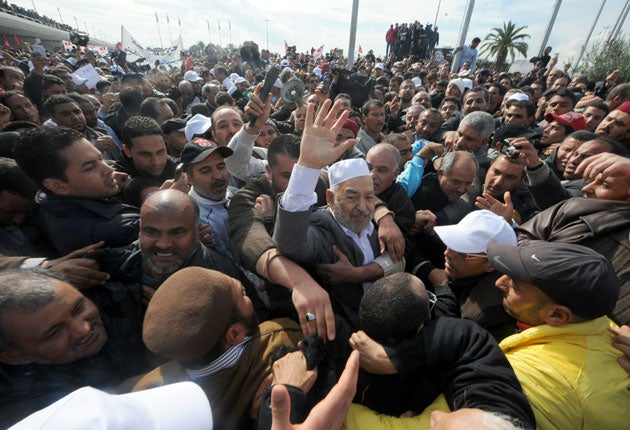Thousands greet Islamist leader's return from exile to Tunisia

Your support helps us to tell the story
From reproductive rights to climate change to Big Tech, The Independent is on the ground when the story is developing. Whether it's investigating the financials of Elon Musk's pro-Trump PAC or producing our latest documentary, 'The A Word', which shines a light on the American women fighting for reproductive rights, we know how important it is to parse out the facts from the messaging.
At such a critical moment in US history, we need reporters on the ground. Your donation allows us to keep sending journalists to speak to both sides of the story.
The Independent is trusted by Americans across the entire political spectrum. And unlike many other quality news outlets, we choose not to lock Americans out of our reporting and analysis with paywalls. We believe quality journalism should be available to everyone, paid for by those who can afford it.
Your support makes all the difference.The leader of Tunisia's largest Islamist movement returned from exile in Britain yesterday to be greeted by thousands of supporters celebrating the arrival of the "lost leader".
Rached Ghannouchi raised his arms in triumph and cried out "Allahhu Akbar" as he walked off the flight from Gatwick at Carthage airport as the crowd sang religious songs and presented him with flowers and the Koran.
Mr Ghannouchi, who had been sentenced in absentia to life imprisonment for alleged terrorist offences, had been away from his country for 23 years. He had said in Britain that he was waiting for the right time to go home after the overthrow of President Zine el-Abedine Ben Ali on 14 January.
Now, with protests surging across the Middle East and the near-collapse of Egypt, his colleagues say he felt the moment had arrived when real change could be obtained.
"When I return home today, I am returning to the Arab world as a whole," said Mr Ghannouchi as he set off on his flight. After arriving in Tunis, the 69-year-old former teacher insisted that he had no plans to run for the presidency, and would instead help to "anchor a democratic system, social justice and to put a limit to discrimination against banned groups. We are taking part so we can move from a one-party system to a true multi-party system without corruption or oppression."
Mr Ghannouchi's followers formed an escort around him after expressing fear that the police might try to arrest him. However, the state security apparatus has steadily unravelled since the fall of the regime of Mr Ben Ali and there was no attempt to stop Mr Ghannouchi by the handful of uniformed staff on duty.
A smaller group of men and women held up banners reading: "No Islamism, no theocracy, no sharia and no stupidity." Members of Mr Ghannouchi's party, Ennahda, claimed that the counter-demonstrators had been duped by the "Godless Ben Ali" and started their own chant of "No to extremism, yes to moderate Islam!" and "No fear of Islam!"
Since independence from France, governments in Tunisia had followed a broadly secular path with periodic crackdowns on what they perceived as Muslim extremism. Mr Ghannouchi, who studied in Cairo and Damascus, returned to his country towards the end of the 1960s and said that he was perturbed by the strength of the secularist movement and the extent of female emancipation.
He was accused of making inflammatory speeches and served six years in prison during the rule of Habib Bourgiba, before being freed in an amnesty by his successor, Mr Ben Ali. However, he soon fell out with the new administration and fled to Algeria and then the UK in 1989.
Mr Ghannouchi's return means that almost all the key players in the opposition to Mr Ben Ali are back in Tunisia. Moncef Marzouki, a human rights activist and the founder of Congress for the Republic, returned from Paris two weeks ago, and other exiles have followed.
But what will happen next remains unclear. Leaders of leftist factions such as Najib Chebbi, Mustafa ben Jaafar and Ahmed Ibrahim, who had remained in the country under the regime, have been offered posts in the interim government by the Prime Minister, Mohammed Ghannouchi. There is no indication that they will be prepared to form an alliance with Islamist groups in the elections due to be held soon.
Apprehension about Islamism remains in Tunis and other main cities. An attempt by a group of Saudi-inspired hardline Salaafists to hold a meeting at a Tunis mosque 10 days ago drew three times as many opponents as adherents.
Despite Mr Ghannouchi's assurance that he does not want to impose sharia law in Tunisia, many remain sceptical of his motives. In the city centre, Naima Ali, a middle-aged woman in a veil, said: "Many people were imprisoned because of him, young people lost their future. No one is happy about his return. He lived the good life in London while others paid a heavy price."
Ibrahim ben Jasim, a doctor, said "His kind of extremist should stay in London, where I have seen a lot of people like him. It does not belong in the Tunisia we are trying to build."
Join our commenting forum
Join thought-provoking conversations, follow other Independent readers and see their replies
Comments